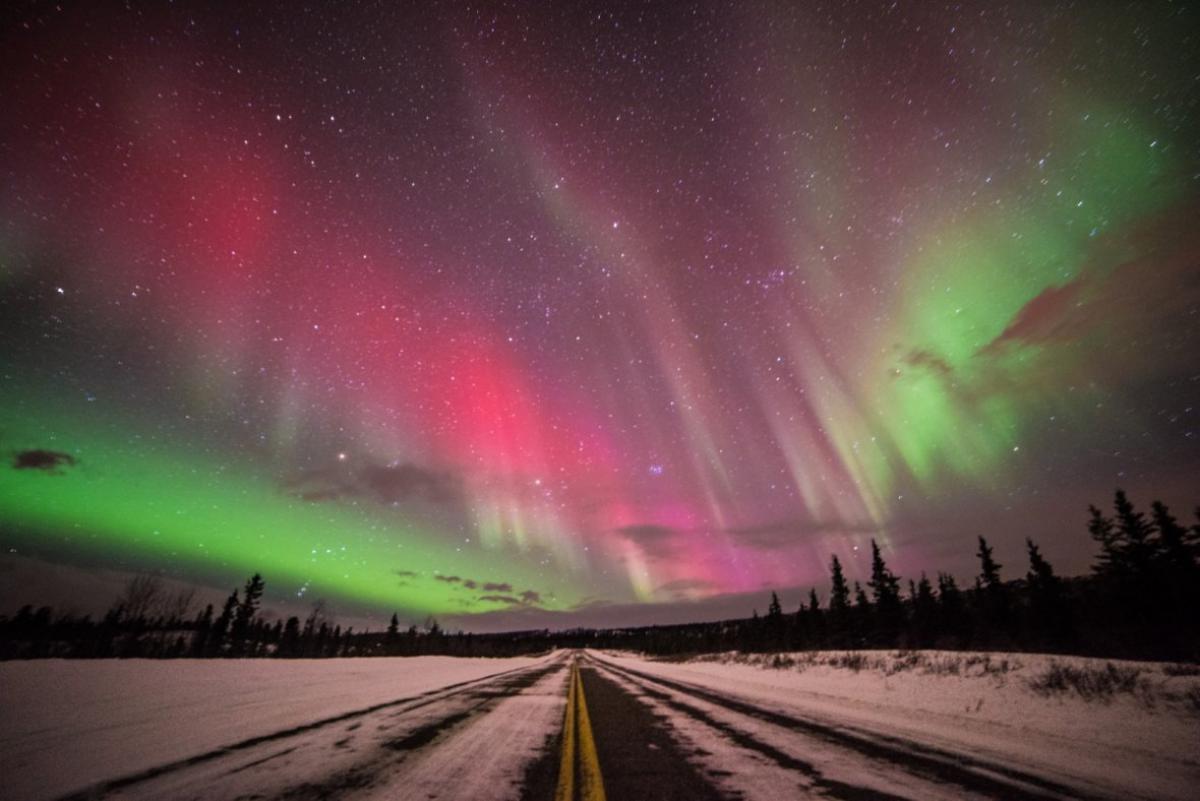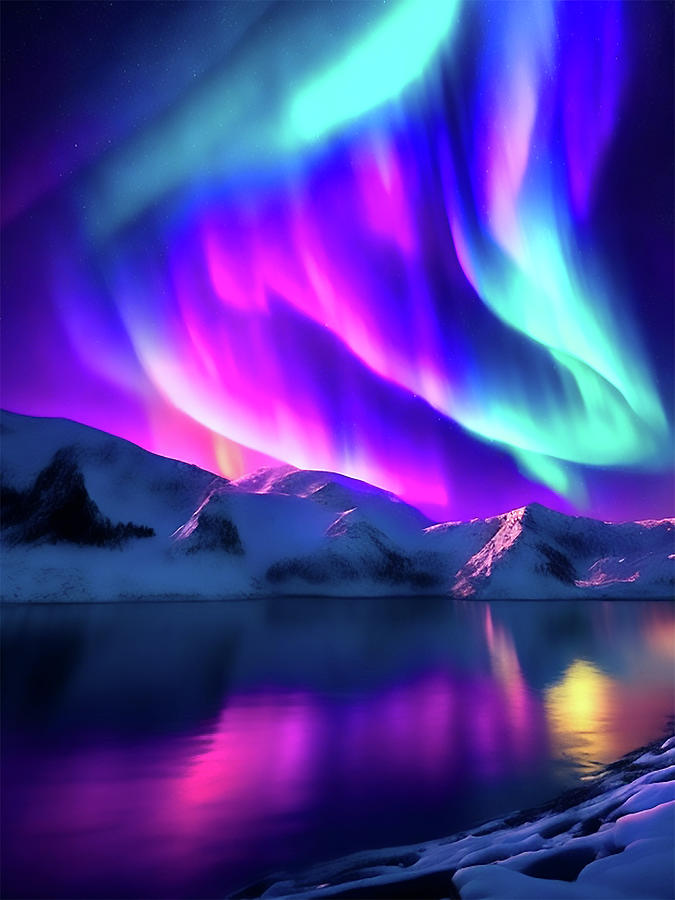The Enchanting Aurora Borealis: A Rare Sight in Rhode Island
Related Articles: The Enchanting Aurora Borealis: A Rare Sight in Rhode Island
Introduction
In this auspicious occasion, we are delighted to delve into the intriguing topic related to The Enchanting Aurora Borealis: A Rare Sight in Rhode Island. Let’s weave interesting information and offer fresh perspectives to the readers.
Table of Content
The Enchanting Aurora Borealis: A Rare Sight in Rhode Island

While the northern lights are most famously associated with high-latitude destinations like Alaska and Norway, their ethereal beauty can sometimes grace the skies of more southerly regions, including Rhode Island. Though sightings are infrequent and unpredictable, the possibility of witnessing this celestial spectacle adds a layer of intrigue to the state’s natural beauty.
Understanding the Northern Lights
The northern lights, also known as the aurora borealis, are a mesmerizing display of light in the sky, typically observed in the northern hemisphere. They are created when charged particles from the sun, known as the solar wind, interact with the Earth’s atmosphere.
As these particles enter the Earth’s magnetic field, they are guided towards the poles. Upon colliding with atoms and molecules in the upper atmosphere, they excite these particles, causing them to release photons, which we perceive as light. The color of the aurora depends on the type of atom or molecule involved in the collision. Green is the most common color, produced by oxygen atoms, while red and blue are produced by nitrogen molecules.
The Science Behind the Aurora’s Appearance in Rhode Island
While the northern lights are primarily visible at high latitudes, they can occasionally extend further south during periods of intense solar activity. This occurs when powerful solar flares or coronal mass ejections release a surge of charged particles towards Earth.
These events can temporarily distort the Earth’s magnetic field, allowing the aurora to penetrate further south. The strength and direction of the geomagnetic storm, combined with the Earth’s magnetic field lines, determine the extent to which the aurora can be seen in lower latitudes.
Factors Affecting Northern Lights Visibility in Rhode Island
Several factors influence the likelihood of seeing the northern lights in Rhode Island:
- Geomagnetic Activity: The intensity of solar activity, measured by the Kp index, is a key factor. A higher Kp index, indicating stronger geomagnetic storms, increases the possibility of auroral displays at lower latitudes.
- Sky Conditions: Clear skies are essential for observing the aurora. Light pollution from cities and towns can significantly hinder visibility.
- Time of Year: The northern lights are more likely to be visible during the winter months, when the nights are longer and darker.
- Location: While sightings are rare, some locations in Rhode Island may offer slightly better chances due to their proximity to the northern horizon and lower levels of light pollution.
Observing the Northern Lights in Rhode Island
While witnessing the northern lights in Rhode Island is a rare treat, it’s not impossible. Here are some tips to increase your chances of seeing this celestial phenomenon:
- Check for Aurora Forecasts: Websites like the Space Weather Prediction Center (SWPC) provide forecasts of geomagnetic activity, including the Kp index.
- Seek Dark Skies: Head to locations away from city lights, such as the beaches of South County or the rural areas of the state.
- Be Patient: The aurora can be unpredictable, so be prepared to spend some time observing the sky.
- Use a Camera: Even if the aurora is faint, a camera with a long exposure setting can capture its beauty.
Related Searches:
1. "Northern Lights Rhode Island Forecast"
Websites like the SWPC provide real-time data and forecasts of geomagnetic activity, which can help predict the likelihood of auroral displays in Rhode Island.
2. "Best Places to See Northern Lights in Rhode Island"
While sightings are rare, some locations in Rhode Island offer better conditions for observing the aurora due to their proximity to the northern horizon and lower levels of light pollution.
3. "When Can I See the Northern Lights in Rhode Island?"
The northern lights are more likely to be visible during the winter months, when the nights are longer and darker. However, sightings are unpredictable and depend on geomagnetic activity.
4. "Northern Lights Rhode Island History"
Historical accounts of aurora sightings in Rhode Island are scarce but offer a glimpse into the past occurrences of this celestial phenomenon.
5. "Northern Lights Rhode Island Photos"
Online platforms like Flickr and Instagram feature stunning photographs of auroral displays captured in Rhode Island, offering a visual representation of this rare event.
6. "Northern Lights Rhode Island Myths and Legends"
Folklore and legends associated with the northern lights in Rhode Island are often intertwined with Native American beliefs and stories of celestial phenomena.
7. "Northern Lights Rhode Island Science"
Understanding the scientific principles behind the aurora, including its formation, color, and relationship to solar activity, provides valuable insights into this natural spectacle.
8. "Northern Lights Rhode Island Events"
Some organizations and astronomy clubs in Rhode Island may host events or workshops related to the aurora, providing opportunities for learning and observation.
FAQs about the Northern Lights in Rhode Island:
Q: Are the Northern Lights visible in Rhode Island every night?
A: No, the northern lights are not visible in Rhode Island every night. Sightings are rare and depend on various factors, including geomagnetic activity and sky conditions.
Q: What is the best time of year to see the Northern Lights in Rhode Island?
A: The winter months, when the nights are longer and darker, offer the best chances of witnessing the aurora. However, sightings are unpredictable and can occur at any time of year during periods of intense solar activity.
Q: How often can you see the Northern Lights in Rhode Island?
A: Sightings of the northern lights in Rhode Island are infrequent and unpredictable. They may occur a few times per year or even less frequently.
Q: What should I look for when trying to see the Northern Lights in Rhode Island?
A: Look for a faint, greenish glow in the northern sky, often appearing as a band or curtain of light. The aurora can also exhibit other colors, including red, blue, and purple.
Q: What are some tips for observing the Northern Lights in Rhode Island?
A: Check aurora forecasts, seek dark skies, be patient, and use a camera with a long exposure setting to capture the aurora’s beauty.
Tips for Observing the Northern Lights in Rhode Island:
- Check the Aurora Forecast: The Space Weather Prediction Center (SWPC) provides forecasts of geomagnetic activity, including the Kp index, which can help predict the likelihood of auroral displays.
- Seek Dark Skies: Head to locations away from city lights, such as the beaches of South County or the rural areas of the state.
- Be Patient: The aurora can be unpredictable, so be prepared to spend some time observing the sky.
- Use a Camera: Even if the aurora is faint, a camera with a long exposure setting can capture its beauty.
- Dress Warmly: Winter nights in Rhode Island can be cold, so dress in layers to stay comfortable.
- Bring a Red Flashlight: Red light is less likely to affect your night vision, allowing you to see the aurora more clearly.
Conclusion:
While the northern lights are a rare sight in Rhode Island, the possibility of witnessing this celestial spectacle adds a layer of wonder and excitement to the state’s natural beauty. By understanding the factors influencing aurora visibility and following the tips outlined above, you can increase your chances of catching a glimpse of this mesmerizing phenomenon. Whether you’re a seasoned skywatcher or a curious observer, the northern lights offer a reminder of the awe-inspiring power and beauty of the universe.








Closure
Thus, we hope this article has provided valuable insights into The Enchanting Aurora Borealis: A Rare Sight in Rhode Island. We thank you for taking the time to read this article. See you in our next article!

